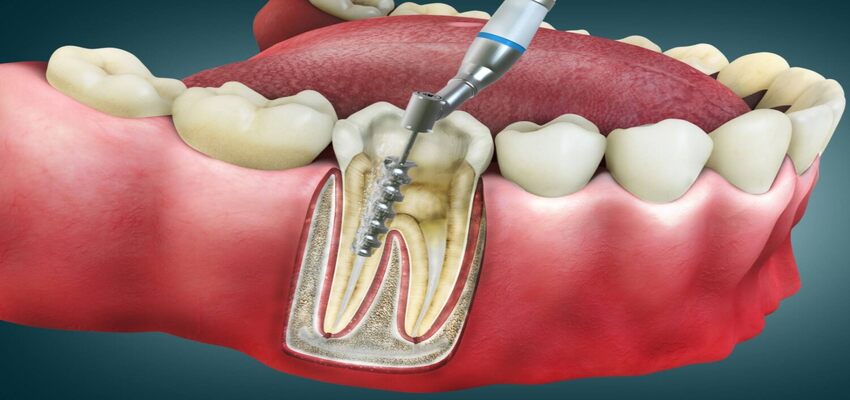
Have you been told that your toddler needs a root canal procedure? Do you feel that extraction would be a better and quicker option for them? Then you are at the right place. Root canal treatment in kids is a minor surgical procedure that involves the removal of the infected and inflamed pulp (central core of your tooth consisting of connective tissue, nerves, and blood vessels), replacing it with a resorbable, biocompatible material, and restoring it with a dental crown (1).
Root canal treatment is always considered the best alternative to extractions. This is because preserving baby teeth can help retain the foundation needed for the proper eruption of permanent teeth. Premature loss of baby teeth can result in dental problems like improper permanent tooth eruption, and crowding. This informative blog focuses on the need for root canal treatment for kids and how safe it is. So keep scrolling!
Why Does Your Kid Need a Root Canal?

Every kid is different with different oral health needs. They have unique dental morphology and sequence of eruption. Toddlers are prone to tooth decay due to poor oral hygiene, and unhealthy eating habits. Moreover being highly active they may also be prone to injuries resulting in dental trauma. Tooth decay and trauma can ultimately result in cavities, infection, and pus discharging abscess formation if not taken care of on time (2).
Persistent infection can result in pain, discomfort, tenderness, redness, and pus discharge that can be daunting. Dentists may recommend root canal treatment when other treatment options like medications and regular dental fillings fail. A root canal treatment is more beneficial than tooth extraction any day! Premature tooth loss can lead to the loss of adequate space for the eruption of permanent teeth, resulting in development problems in kids.
The following signs and symptoms suggest the need for root canal treatment in toddlers (3)-
- Extreme tooth pain
- Increased sensitivity to hot and cold foods
- Swollen and inflamed gums
- Trouble chewing
- Discolored tooth
- Bad breath (halitosis)
- Fever
- Loss of appetite
- Trouble sleeping
- Lethargy
3 Things to Know About The Root Canal Procedure For Kids

Every parent would be nervous and anxious when their toddler would need extensive dental procedure like a root canal. It is common to have several queries going on in your mind to ensure the entire procedure goes on smoothly without much discomfort to the toddler. Here are three things you must know about root canal procedures for kids-
1. Kid Will be Given Anesthesia
Root canal procedure is always performed under local anesthesia. This is because your toddler would already be suffering from tooth pain and sensitivity which makes them less cooperative. To help them cooperate and ease their pain further, they will be given a local anesthesia spray or shot (4).
2. They Will Need Dental Crown
Since root canal treatment involves the removal of the entire inflamed pulp, the tooth becomes hollow and weak. Such teeth would be susceptible to fracture. Thus, root canal-treated teeth must be restored with suitable dental crowns (5).
3. Procedure Will Take 30 to 60 minutes
Root canal treatment is an extensive procedure which may take around 30 to 60 minutes. This depends on the extent of infection and how well your toddler cooperates. So be well prepared to spend a little extra time until the procedure is completed (6).
Does Your Toddler Require Root Canal?

Whether or not your toddler requires a root canal is determined by the pediatric dentist depending on their individual oral health condition. Your kid may require a root canal if other management approaches like painkillers, and dental fillings fail to provide relief. Tooth decay or trauma with pulp involvement can cause a cascade of painful symptoms which makes a root canal treatment mandatory.
With advanced technology in the form of rotary instruments, and dentist expertise, you can safely opt for root canal treatment for your toddler rather than extractions (7). Root canal treatment can greatly preserve your toddler’s primary teeth and prevent future dental development problems like misalignments.
Look no further when it comes to the integrity and vitality of your toddler’s oral health. There is no need to be apprehensive about getting root canal for them. Their pediatric dentist is the best judge to determine if root canals will benefit your toddler. With advanced technology and the dentist’s expertise, root canals are considered safe for your toddlers. If you notice any painful symptoms consult a pediatric dentist right away!
FAQ’s
1. Is it Normal to do a Root Canal on Baby Teeth?
Yes, it is normal to do a root canal on baby teeth. This procedure may be needed to save extensively decayed and damaged baby teeth, and restore oral form and function. Root canal treatment for baby teeth may also help prevent unwanted extractions and premature loss of baby teeth that may negatively impact the eruption of permanent teeth.
2. What Are The Dangers of Root Canals in Children?
The main risk of performing a root canal in children is their age. Their teeth may not be as resilient as adult teeth and kids may not be aware of what’s going on with them, which may lead to anxiety and fear. Furthermore, the use of root canal filling material may sometimes damage the surrounding tissues leading to bruising and swelling.
3. What is The Youngest Age For a Root Canal?
Root canal treatment can be done at any age. There is no age limit for performing root canal procedures since it is needed whenever the teeth are severely damaged or decayed, irrespective of age. However, toddlers as young as 3 years old can also get a root canal treatment if needed.
References
- Pratheebha C, Gayathri R, Veeraraghavan VP, Kavitha S. Knowledge, awareness, and perception on root canal treatment among South Indian population – A survey. J Adv Pharm Technol Res. 2022 Nov;13(Suppl 1):S302-S307. – https://www.ncbi.nlm.nih.gov/pmc/articles/PMC9836173/
- Popoola BO, Ayebameru OE, Olanloye OM. ENDODONTIC TREATMENT IN CHILDREN: A FIVE-YEAR RETROSPECTIVE STUDY OF CASES SEEN AT THE UNIVERSITY COLLEGE HOSPITAL, IBADAN, NIGERIA – https://www.ncbi.nlm.nih.gov/pmc/articles/PMC6580413/
- Asgary S, Eghbal MJ. Challenging the Misnomer of Irreversible Pulpitis and Deliberating the Urgent Need for Reclassification of Pulpal Diseases Based on the Efficacy of Vital Pulp Therapies: An Overview of Systematic Reviews – https://www.ncbi.nlm.nih.gov/pmc/articles/PMC10565994/
- Erdogan O, Casey SM, Ruparel NB, Sigurdsson A. Bupivacaine for Root Canal Treatment – Practitioner Behaviors and Patient Perspectives: Survey Studies. Local Reg Anesth. 2022 Feb 3;15:11-21 – https://www.ncbi.nlm.nih.gov/pmc/articles/PMC8820451/
- The Use of Dental Crowns for Endodontically Treated Teeth: A Review of the Clinical Effectiveness, Cost-effectiveness and Guidelines [Internet]. Ottawa (ON): Canadian Agency for Drugs and Technologies in Health; 2015 May 13. – https://www.ncbi.nlm.nih.gov/books/NBK304710/
- Londhe SM, Garge HG. Single Visit Root Canal Treatment. Med J Armed Forces India. 2007 Jul;63(3):273-4 – https://www.ncbi.nlm.nih.gov/pmc/articles/PMC4922381/
- Casaña Ruiz MD, Martínez LM, Miralles EG. Update in the Diagnosis and Treatment of Root Canal Therapy in Temporary Dentition through Different Rotatory Systems: A Systematic Review. Diagnostics (Basel). 2022 Nov 13;12(11):2775 – https://www.ncbi.nlm.nih.gov/pmc/articles/PMC9689064/
